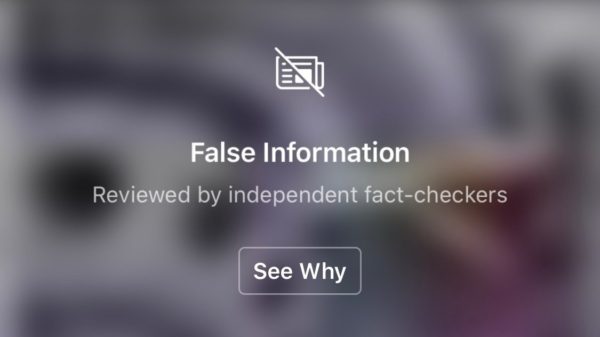

Facebook admitted that its so-called “fact-checking” program is actually cranking out opinions used to censor certain viewpoints.
In its latest legal battle with TV journalist John Stossel over a post about the origins of the deadly 2020 California forest fires, Facebook, now rebranded and referred to as “Meta,” claims that its “fact-checking” program should not be the target of a defamation suit because its attempts to regulate content are done by third-party organizations who are entitled to their “opinion.”
Stossel’s original complaint questioned whether “Facebook and its vendors defame a user who posts factually accurate content when they publicly announce that the content failed a ‘fact-check’ and is ‘partly false,’ and by attributing to the user a false claim that he never made?”
Facebook, however, claimed that the counter article authored by Climate Feedback is not necessarily the tech giant’s responsibility.
Facebook went on to complain that Stossel’s problem isn’t with the Silicon Valley giants’ “labels” on his content but with the obscure organizations that Facebook employs to do its “fact-checking” dirty work.
“The labels themselves are neither false nor defamatory; to the contrary, they constitute protected opinion,” Facebook admitted.
“And even if Stossel could attribute Climate Feedback’s separate webpages to Meta, the challenged statements on those pages are likewise neither false nor defamatory.
Any of these failures would doom Stossel’s complaint, but the combination makes any amendment futile.”
Is Facebook admitting here that its “fact checks” are not really “fact” checks at all, but merely opinion assertions? Also, by FB claiming its labels constitute “opinions” then doesn’t that make it a publisher? https://t.co/ipCwXnnSvr pic.twitter.com/hOcjFRnCT2
— Nick Short (@PoliticalShort) December 11, 2021
It’s no secret that Facebook uses its “fact-checking” program to curb information that it wants to be censored, and this November lawsuit gives more insight into the Big Tech company’s methods and twisted rationale.
“The independence of the fact-checkers is a deliberate feature of Meta’s fact-checking program, designed to ensure that Meta does not become the arbiter of truth on its platforms,” the lawsuit stated before admitting that “Meta identifies potential misinformation for fact-checkers to review and rate. … [I]t leaves the ultimate determination of whether the information is false or misleading to the fact-checkers.
And though Meta has designed its platforms so that fact-checker ratings appear next to content that the fact-checkers have reviewed and rated, it does not contribute to the substance of those ratings.”
________________________________________________________________________________
more recommended stories
 Fentanyl Seizures at Border Continue to Spike, Making San Diego a National Epicenter for Fentanyl Trafficking
Fentanyl Seizures at Border Continue to Spike, Making San Diego a National Epicenter for Fentanyl TraffickingFentanyl Seizures at Border Continue to.
 Utah Man Sentenced for Hate Crime Attack of Three Men
Utah Man Sentenced for Hate Crime Attack of Three MenTuesday, August 8, 2023 A.
 Green Energy Company Biden Hosted At White House Files For Bankruptcy
Green Energy Company Biden Hosted At White House Files For BankruptcyAug 7 (Reuters) – Electric-vehicle parts.
 Former ABC News Reporter Who “Debunked” Pizzagate Pleads Guilty of Possessing Child pδrn
Former ABC News Reporter Who “Debunked” Pizzagate Pleads Guilty of Possessing Child pδrnFriday, July 21, 2023 A former.
 Six Harvard Medical School and an Arkansas mortuary Charged With Trafficking In Stolen Human Remains
Six Harvard Medical School and an Arkansas mortuary Charged With Trafficking In Stolen Human RemainsSCRANTON – The United States.
 Over 300 People Facing Federal Charges For Crimes Committed During Nationwide Demonstrations
Over 300 People Facing Federal Charges For Crimes Committed During Nationwide DemonstrationsThe Department of Justice announced that.
